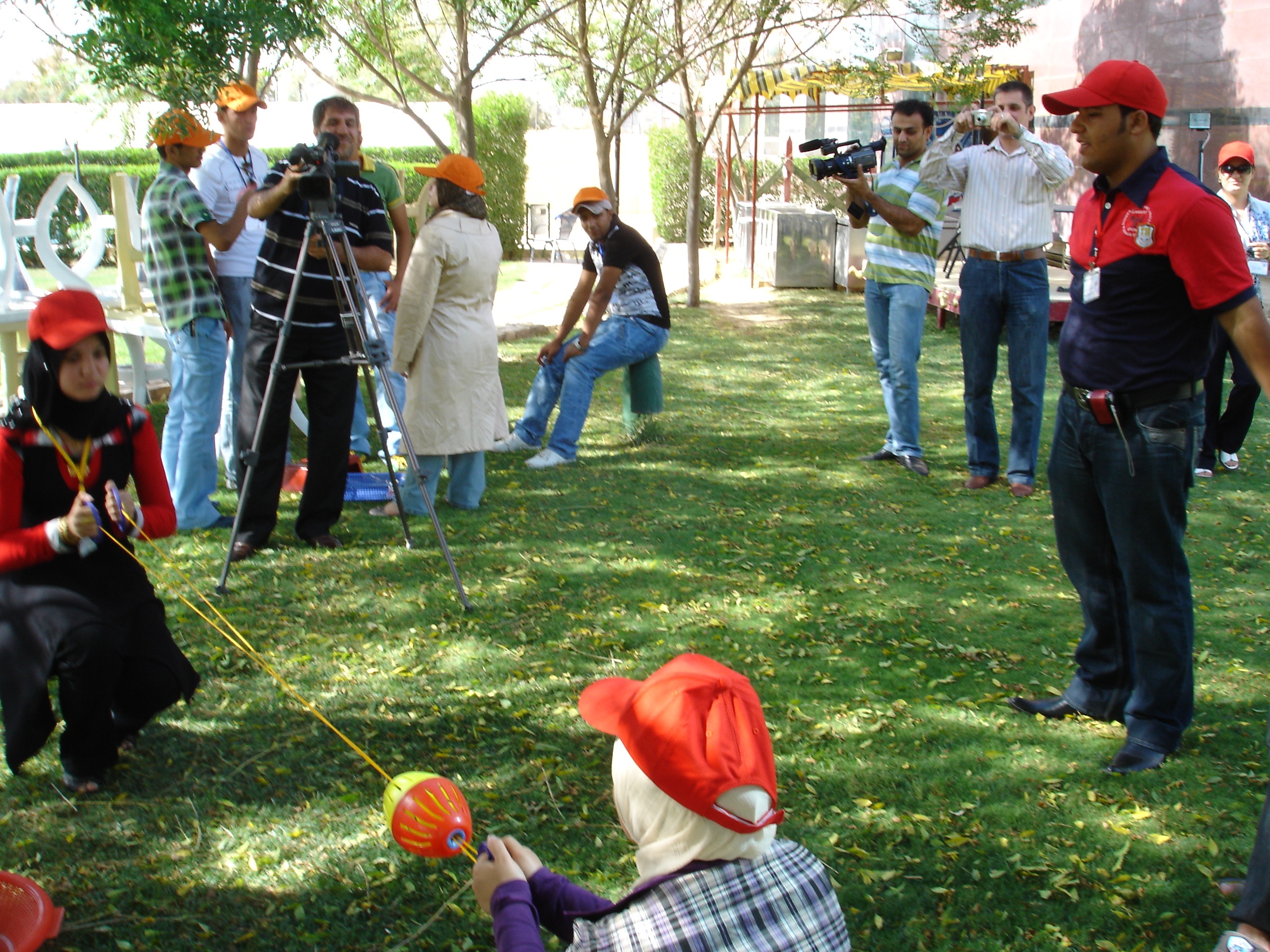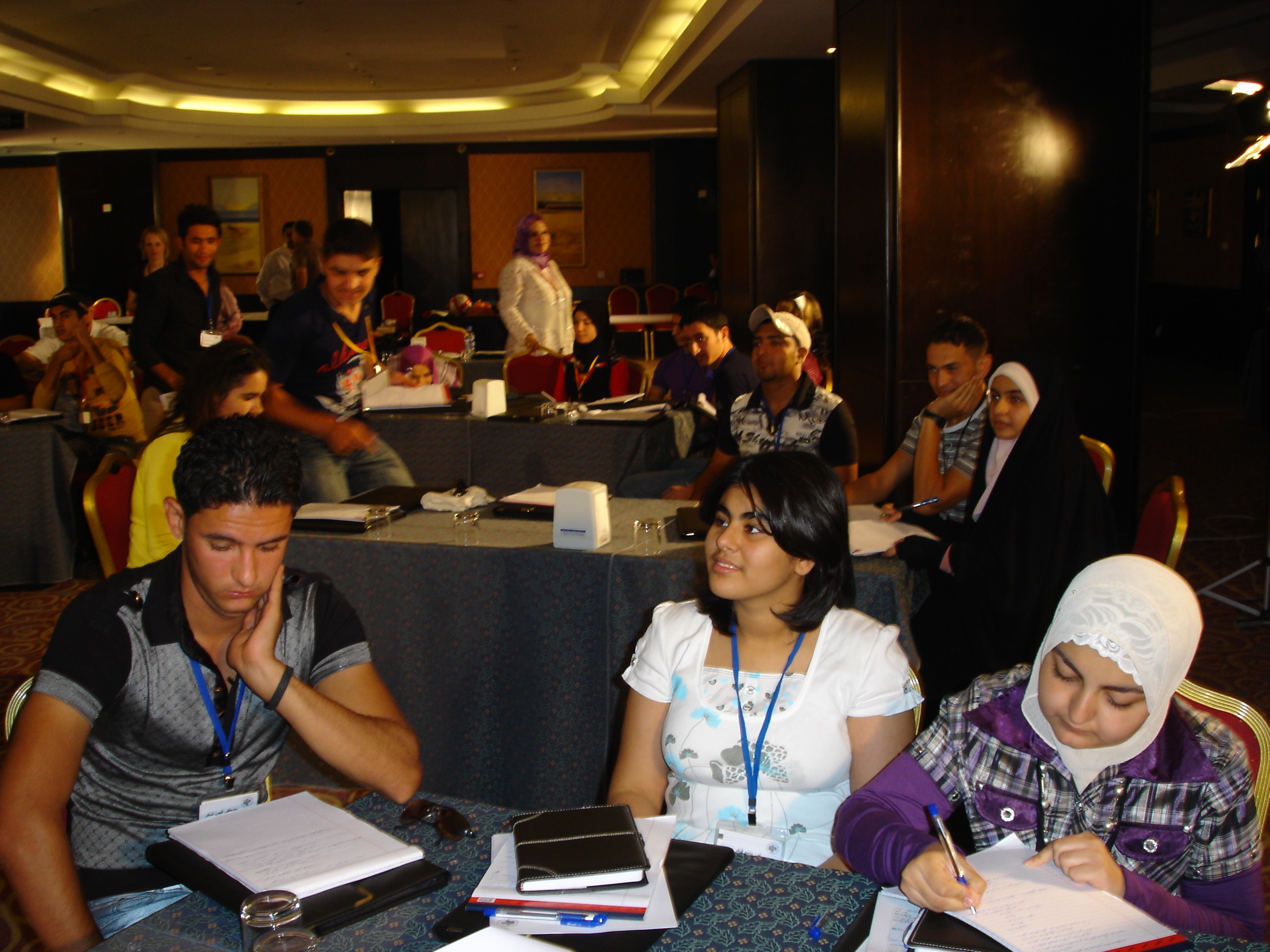On August 3-4, USIP’s Center of Innovation for Media, Conflict and Peacebuilding conducted a two-day youth summit in Erbil as part of the "Peace Media for Iraqi Youth" project. USIP, along with four local NGOs, brought together 30 Iraqi youth (ages 14-18) from across the country to participate in activities aimed at supporting a new and growing community of young Iraqis committed to peacebuilding.
Posted: January 8, 2010
By Theo Dolan
On August 3-4, USIP’s Center of Innovation for Media, Conflict and Peacebuilding conducted a two-day youth summit in Erbil as part of the "Peace Media for Iraqi Youth" project. USIP, along with four local NGOs, brought together 30 Iraqi youth (ages 14-18) from across the country to participate in activities aimed at supporting a new and growing community of young Iraqis committed to peacebuilding. An Iraqi production group filmed the event in order to create a TV Special program, and Sesame Workshop producer Brett Pierce moderated the summit proceedings.
As a precursor to future USIP work with youth in Iraq, the summit was designed to provide a diverse group of Iraqi youth (Sunni, Shia and Kurd) with the tools to become active contributors to the peace process in their communities. The summit activities were created to address some of the challenges faced by youth in Iraq today: lack of cultural identity, few options for recreation/entertainment, poor communication among youth, and little educational focus on gender, ethnic tolerance and human rights issues. Ideally, the project will serve as a positive resource for Iraqi youth, in contrast with the myriad of negative influences such as extremist groups or crime.
 In preparation for the summit, local NGOs held a number of workshops in four Iraqi regions (Basra, Baghdad, Hilla, and Sulaymaniyah). At these workshops, the thirty youth--in groups of 6-10 from each region--created their own short films and performances for the summit. Emulating the planned summit activities, the workshops utilized "youth-generated content," in which participating youth determined the ultimate outcomes and expressed themselves independently on camera. Additionally, USIP created a social networking site with the goal of allowing participants to stay connected and support each other in their future peacebuilding efforts.
In preparation for the summit, local NGOs held a number of workshops in four Iraqi regions (Basra, Baghdad, Hilla, and Sulaymaniyah). At these workshops, the thirty youth--in groups of 6-10 from each region--created their own short films and performances for the summit. Emulating the planned summit activities, the workshops utilized "youth-generated content," in which participating youth determined the ultimate outcomes and expressed themselves independently on camera. Additionally, USIP created a social networking site with the goal of allowing participants to stay connected and support each other in their future peacebuilding efforts.
Over the course of the two-day summit, this spirited group of young Iraqis took part in a number of activities designed to develop the necessary tools for the next generation peacebuilder. This included the ability to express oneself freely, and understanding the importance of positive group dynamics, effective communication, and teamwork. Among the most popular activities were the film competition, quiz show, and final performances. Each regional group created a short film in preparation for the summit, where the youth participants voted on the films to select a winner. The quiz show was staged at the Kurdish Textile Museum in Erbil’s Citadel and featured a number of questions on Iraqi history and culture, as well as a set of questions based on a survey of Iraqi youth responses regarding media and peacebuilding. The final round featured the top two teams competing in a decision-making exercise that the youth in the audience judged. For the summit finale, each regional group (Baghdad, Hilla, Basra, and northern Iraq) gave unique performances, culminating with the entire group coming together to perform one final song--a version of Kathum el Saher’s national anthem.
 Beyond these activities, the participants created an environment in which sectarian and ethnic affiliation took a backseat to their common experience as Iraqi youth. For example, one bilingual (Kurdish/Arabic) girl translated for two boys that spoke different languages. This proved to be a pivotal moment for many teens. Those that had been shy and awkward initially later spontaneously shared in the singing of popular songs. One boy even rapped in Kurdish for the entire group.
Beyond these activities, the participants created an environment in which sectarian and ethnic affiliation took a backseat to their common experience as Iraqi youth. For example, one bilingual (Kurdish/Arabic) girl translated for two boys that spoke different languages. This proved to be a pivotal moment for many teens. Those that had been shy and awkward initially later spontaneously shared in the singing of popular songs. One boy even rapped in Kurdish for the entire group.
In the end, the participants returned to their communities having begun to acquire important peacebuilding skills, while also making strong bonds with youth from different regions of Iraq. Their enthusiasm for the experience in Erbil can be seen daily on the social networking website, where youth participants have continued actively chatting and posting discussion forums, videos and photos. In early 2010, the website will be managed by the summit participants, and they will decide how best to include other Iraqis their own age, and how to engage them on peacebuilding issues.
The summit represented a unique process both in peacebuilding for Iraqi youth as well as in television production for a teenage Iraqi audience. By engaging youth in a series of activities that fostered understanding of self, community, country and the world as well as understanding the positive role youth can take in bringing about peace, a new constituency of peacebuilders is forming. The 30-minute TV Special program based on material from the summit will be broadcast over a network of Iraqi television channels in early 2010. Following carefully targeted research, USIP and its Iraqi partners will then produce an 8-10 episode TV series for Iraqi teens. Using the Special as a guide, the series will be developed by Iraqi youth for Iraqi youth.



